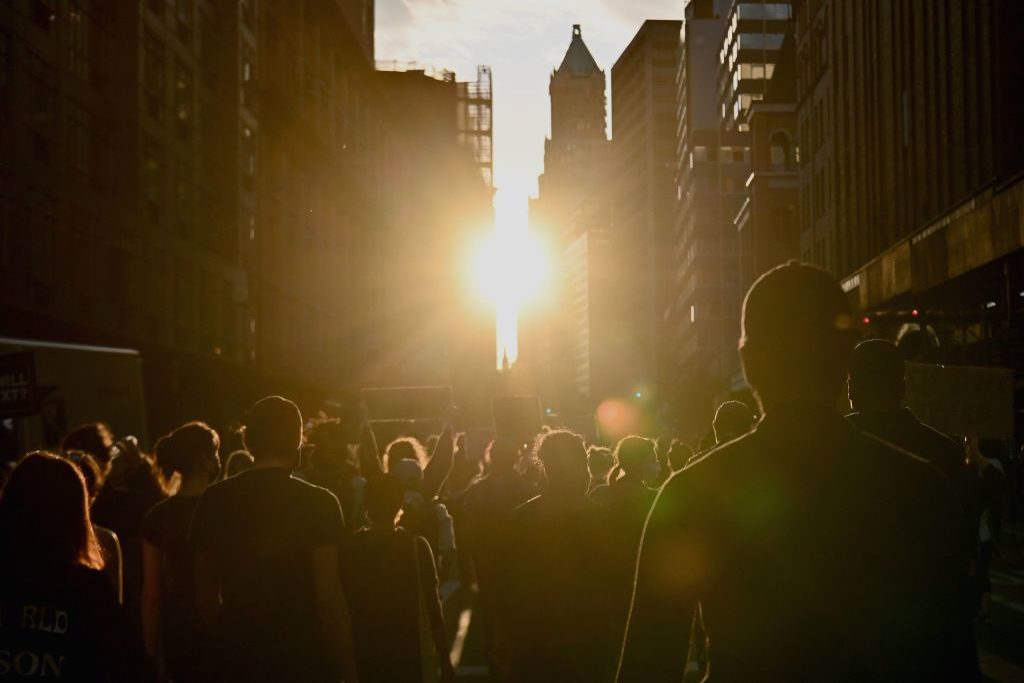Nearly three months into lockdown, 40 million Americans were unemployed. Kids lost out on three months of schooling. Businesses shuttered, many never to open again. Mental health suffered. People lost their homes. Tens of thousands died alone in hospitals, family members were prevented from holding the hands of their loved ones in their final days, and in many cases they weren’t allowed to bury them or hold a funeral.
Parents struggled to balance distance learning and work. Teachers worried that their most vulnerable students weren’t logging in to class. People couldn’t receive medical treatment or attend birthdays and graduations.
But humans are creative, resilient creatures, and it didn’t take long before we adjusted to living online. Necessity forced ingenuity. AA meetings, fitness classes, happy hours and business meetings all pivoted to Zoom. We started group chats with family members and college friends to stay connected. Mostly, we shared memes.
We posted pictures of the dog we adopted, or the sourdough we attempted to make, or the projects in our houses we’d been putting off forever that we finally got to finish, just to try to stay optimistic. There were silver linings, too. Much ink was spilled about learning to slow down, finding joy in being home with the family. All that time commuting — was it worth it? Who did we value — and why? Instead of honoring celebrities, athletes and musicians, we applauded nurses, doctors, truck drivers and grocery-store cashiers. We smiled at each other with our eyes as we stood six feet apart in lines. A feeling of solidarity and grit in the face of a common hardship pervaded, for a brief moment.
Pundits wondered, naively, ‘Did COVID-19 kill the culture wars?’
The world stopped and we were forced to sit with the uncomfortable truths we’d been avoiding about ourselves, our marriages, our choices. But instead of looking deeply within for the solutions, many of us sought escape in substances and Netflix, and searched for answers on social media. It went from an addiction we needed to get over to the only way we could feel connected to one another.
The majority of us reluctantly went along with the shutdown in order to flatten the curve and help hospitals catch up. We applauded our doctors and nurses on the front line every night in our cities. We became familiar with terms such as ‘social distancing’ and PPE. Masks became the must-have fashion accessory of the spring season, even though we weren’t entirely sure if we needed to wear them. Many of us became armchair epidemiologists and constitutional lawyers.
We fought about whether or not our government was doing the right thing. Some people felt it was authoritarian overreach and took to the streets in protest. They were widely condemned and told they were killing grandma for the sake of a haircut. But many were struggling to put food on the table and keep a roof over their heads. With lack of trust in our leaders, media and experts at an all-time high, conspiracy theories and disinformation flourished. As the lockdown dragged on, tensions rose. The smiles of solidarity became averted eyes.
Then, on May 25, as some states were beginning to open up, an officer put his knee on George Floyd’s neck for a full, excruciating eight minutes and 46 seconds. Floyd told the officer he couldn’t breathe, and he called for his dead mama as he died. The whole world saw the video — over and over again.
And the pent-up population took to the streets, enraged. Protest is the appropriate reaction to what we witnessed, and it’s inspiring to know we aren’t all so hopeless or dead inside that we are no longer moved. People are rightfully furious about police brutality. But being smack dab in the middle of a pandemic, the protests turned out to be gasoline on the smoldering embers of the culture wars.
Overnight, the same people who were shaming Christians who wanted to go to church so Jesus could save them from coronavirus were out in the streets. The non-protesters were furious that they were still being told to stop everything while thousands of people marched. They watched helplessly as cities were looted and burned by anarchists and opportunists.
The subsequent mainstream-media gaslighting campaign was mind-bending. After all the sacrifices, people had some questions about why one week protesting was killing grandma, but the next it was acceptable for thousands of people to gather. It was a valid question. If you dared to ask it, you were called a racist. ‘The true virus is white supremacy,’ we were told. Protesting is okay if the cause is righteous. Sorry, wanting to provide for your family or hold your mother’s hand while she dies just isn’t righteous enough?
[special_offer]
Meanwhile, COVID-19 cases have continued. States now wrestle with how best to reopen. We have an election in four months. Resentments are festering. Some centuries old. Some decades. Some months. All of this is going to get worse.
Social media escalates the tensions. It’s a hotbed of anonymous trolls, agents of chaos and bad-faith arguments. It brings out the worst in us because the algorithm rewards us for being tribal, divisive and emotional. It preys on our worst instincts. The algorithm doesn’t want to be fed compassion, nuance and reason. Peace isn’t profitable. Social media demands the scalps of the canceled. It wants nothing less than our souls and war.
So if you feel insane, I promise you — you are not alone. We live in mad times and in an effort to keep up with the chaos, we end up on social media trying to make sense of it all. But there we find an even crazier virtual battleground, and that only feeds the madness in real life. If we want to save ourselves from the toxic virus of hate, we need to start practicing social media distancing. Before it’s too late.
This article is in The Spectator’s July 2020 US edition. Subscribe here to get yours.


















